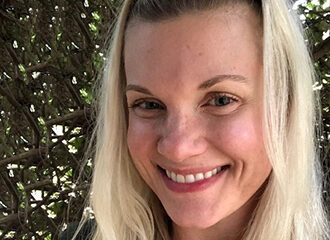Written by: Adrienne Ressler, LMSW, CEDS is Vice President, Professional Development, The Renfrew Center Foundation
Body image obsession is a part of our culture. Understanding it in the context of today’s world is the first step in helping someone who is struggling.

Throughout life the body never loses its power to inform, express and connect, yet individuals who have difficulty moving through life’s challenges, often detach from their emotions and body sensations in an attempt not to “feel” their feelings. As a result, they may turn to other methods to live up to the high, and usually unrealistic, standards they have established for themselves – setting the stage for an eating disorder to emerge.
What Is Body Image?
There are many ways to define body image, but the basic components include how you see yourself, how you believe others see you, and how you feel living in your body.
Although social media plays a large role in influencing how a person feels, these three components have built up over time and almost always include negative self-talk, anxiety, body shame, and a hunger for acceptance. The body may be holding onto experiences that your loved one doesn’t remember or be something that occurred well before they had the ability to talk or make sense of what was happening in their life.
What is Body Image Obsession?
Body image obsession represents a preoccupation or intense focus on overcoming the “negative” attributes or aspects an individual perceives their body to have. While preoccupation with ones’ appearance has been going on for centuries, what is different in today’s world is the inordinate amount of attention given to one’s body as the sole determining factor of one’s worth.
This quest for perfection, however, always fails because the “perfect” body does not exist – it is based on images of idealized and unattainable beauty. Nor is it possible to achieve “almost perfect” without the use of drastic measures – cosmetic surgery, digital re-touching, excessive exercise, and dieting practices – unfortunately often leading to body loathing.
Despite preoccupation with their bodies, these individuals are not living in their bodies but, rather, are cutting themselves off from their bodies and the information, emotions, feelings, and signals that the body holds as a guide.
Who Does Body Image Obsession Affect?
Body image obsession is not found only in the U.S., but around the globe and, while women, adolescents and girls are usually the targets of the beauty and weight-loss industries, in recent years men, children, all races, religions, genders have emerged as targets.
Why Is Understanding Body Image Obsession More Important Than Ever?
The past few years have shown an increase in eating disorders around the globe. The rise of social media, the pandemic, the transition to wearing masks and being schooled or working from home created an anxiety perpetuated by the fact that no one had the answers of how or when this would end.
More time for social media has resulted in more time for individuals to compare themselves to celebrities, influencers and friends and coming up “short”. Outside of social media, the “not knowing” along with isolation and in-person times with friends and family seemed to be taking a toll on everyone. Those, whose propensity to stay strong during this time was challenged, were more likely to develop an eating disorder than before the pandemic.
How Body Image Obsession Can Lead to Disordered Eating
The rituals and obsessions that keep your loved one stuck in patterns that are not life-affirming can be powerful – each time we think or re-think a belief or event, that memory is strengthened through repetition and reinforcement. Repetition of messages and experiences over time become internalized and influence not only our self-perception and self-talk, but the body itself. Repetitive negative self-talk becomes so familiar it feels “true” and, thus, becomes a part of one’s identity. Words like “disgusting”, “gross,” and “repulsive” come to be part of a belief system of “who I am”.
That said, eating disorders and body image issues do not happen overnight and emerge differently depending on the individual’s age, body build, temperament, amount of television and social media they watch, their inherited traits (both physical and emotional), and a host of other factors.
Not everyone who diets or enters a marathon will wind up with an eating disorder or body image issues but, over time, a vulnerability in an individual can transform into problematic issues if not addressed.
Signs a Loved One May Be Obsessed with Their Body Image
Below are some of the signals that refer to an array of symptoms that may indicate your loved-one needs help. These signals represent emotionally driven behaviors (EDBs) based on the individual’s perception of their own body as well as the perception they believe others see in them. These EDBs may include any of the following:
- Obsession with food
- Changes in behavior
- Reluctance to engage in previous activities
- Increased negative self-talk
- Mood changes
- Increased weighing of self
- Rigidity
- Hiding or hording food
- Constant fear of gaining weight
- Never satisfied with their body
- Spends time searching for flaws
- Quick loss of weight
- Hides vomiting and remains from bingeing
- Perfectionism
Things to Consider Before Helping a Loved One
When someone you care about is suffering, it is difficult to know just what to do or how to behave. This is an issue that presents itself often and it is important to think through how to proceed prior to running to the rescue. Here are some questions to think about:
- How much do I want to know about the problem or be involved?
- What are my feelings about the person who is having the problem?
- Can I be honest about my feelings at some point?
- Do I feel compassion for this person?
- Am I able to have self-compassion to help me be involved?
- What have I tried in the past to help with this problem?
- What is my usual way of showing I care?
- What is the way this person responds to my caring style?
- Am I willing to accept criticism and be asked to make changes?
- Am I willing to tell the truth about my feelings?
- Am I open to being a listener?
- Will I be open to understanding that the problem is more than the eating disorder itself.
Conclusion
It is important to keep in mind that your loved one is not purposely being “difficult” but is stuck in the negative rituals and beliefs that fuel the eating disorder – this will be essential in building the trust and support so helpful to those in recovery.



